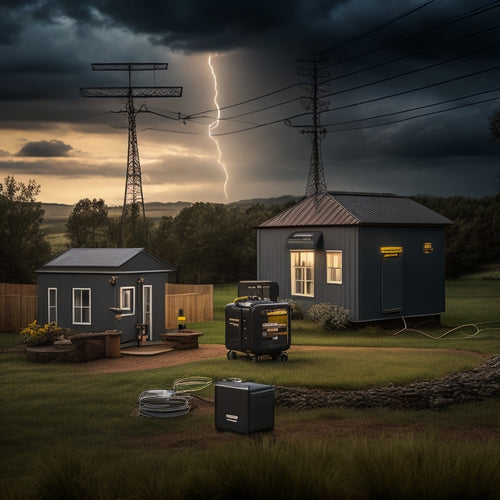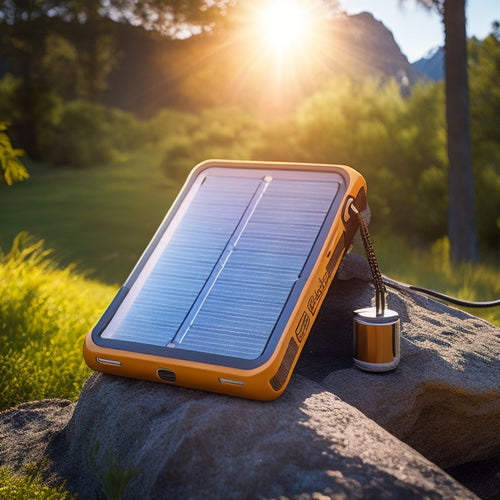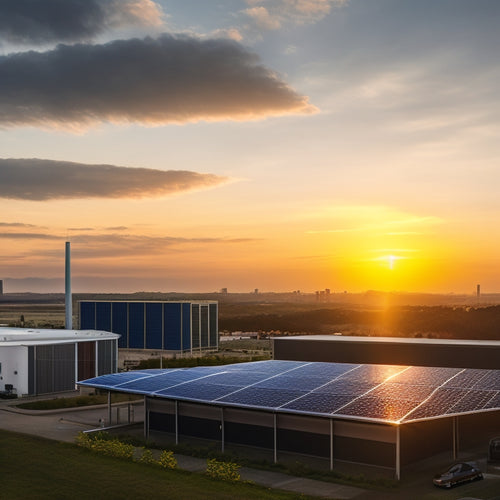
What Are the Best Home Energy Storage Batteries
Share
When selecting the best home energy storage batteries for your needs, you'll want to take into account top brands like Tesla, LG Chem, and Sonnen, which offer high-performance solutions with advanced features, as well as evaluate key factors such as battery type, capacity, cost, warranty, and maintenance requirements. You'll need to assess your energy storage needs, evaluate lithium-ion, lead-acid, and flow batteries, and take into account features like battery capacity, cost per kilowatt-hour, warranty duration, and safety certifications. As you weigh your options, be sure to investigate the intricacies of installation, ongoing maintenance, and energy capacity to find the best fit for your home energy system, and learn how to optimize its performance.
Overview
- Top home energy storage battery brands include Tesla Powerwall, LG Chem, Sonnen Eco, and Enphase Encharge, known for their performance and features.
- Lithium-ion batteries are a popular choice due to their high energy density, long lifetimes, and cost-effectiveness, with prices ranging from $5,000 to $20,000+.
- Key features to consider when selecting a battery include capacity, depth of discharge, round-trip efficiency, warranty duration, and safety certifications like UL 1973 or IEC 62619.
- Battery durability and maintenance are crucial, with regular checks, monitoring metrics, and performance management essential for efficiency and safety, and potential replacement of battery cells over time.
- Evaluating brand reputation, warranty options, and maintenance requirements is vital in selecting the best home energy storage battery for your needs and budget.
Top Brands for Home Energy Storage
Three prominent brands currently dominate the home energy storage market, offering a range of battery solutions to suit diverse needs. You have Tesla Powerwall, a popular choice for its sleek design and seamless integration with solar panels.
LG Chem and Sonnen Eco provide high-performance batteries with advanced features. When selecting a brand, it's crucial to evaluate brand reputation and consider factors like warranty options and maintenance requirements.
Enphase Encharge and Generac PWRcell cater to specific needs, such as whole-home backup and smart energy management. Other notable brands include Blue Planet, Panasonic EverVolt, BYD Battery Box, Simpliphi Power, and Outback Power.
Each brand offers unique features, capacities, and warranties, giving you a range of options to choose from. You can select the best fit for your energy storage needs, ensuring you have reliable power when you need it most.
Battery Types and Their Benefits
When evaluating home energy storage batteries, it's vital to contemplate the type of battery that best suits your needs.
Lithium-ion batteries offer advantages like high energy density and long lifetimes, making them a popular choice. However, lead-acid batteries have drawbacks such as lower energy density and shorter lifetimes.
Flow batteries, on the other hand, show potential for long-duration energy storage. In addition, deep cycle batteries like Rolls Deep Cycle Batteries offer up to 5,000 cycles at 50% DOD, making them a reliable option for renewable energy systems.
Moreover, considering the maintenance frequency and performance management of batteries is important, as it can greatly impact their lifespan and overall efficiency.
Solid-state innovation is also gaining traction, promising enhanced safety and performance. Hybrid systems that combine different battery types are another option.
Considering recycling options is important, as some batteries are more environmentally friendly than others.
Key Features to Consider
Your energy storage goals and values are unique, and so are the key features you should consider when selecting a home energy storage battery.
You'll want to think about the battery's capacity, depth of discharge, and round-trip efficiency to ascertain it meets your energy needs.
When evaluating battery options, consider the cost per kilowatt-hour (lithium-ion battery prices), as well as the warranty duration and lifespan, with recommended warranties lasting at least 10 years for parts and labor.
Look for certifications that meet safety standards, such as UL 1973 or IEC 62619, to guarantee a safe installation.
Additionally, consider the environmental impact of the battery's production and recyclability. Some batteries may use conflict minerals or have a larger carbon footprint than others.
Cost and Installation Factors
When evaluating home energy storage batteries, you'll need to take into account the upfront costs, which vary widely depending on the type and capacity of the battery.
Installation complexity factors, such as the need for additional electrical infrastructure, will also impact the overall cost and timeline.
Additionally, you should reflect on ongoing maintenance needs, including monitoring and potential replacement of battery cells, to guarantee peak performance and longevity.
Upfront Battery Costs
The upfront cost of a home energy storage battery system can be a significant investment, with prices ranging from $5,000 to $20,000 or more, depending on the type and size of the system.
As you consider your options, you'll want to weigh the upfront investment against the potential long-term savings and benefits. A cost comparison between different systems can help you make an informed decision.
Be sure to factor in the cost per kilowatt-hour (kWh) of storage, as well as any additional features or components that may be required.
Installation Complexity Factors
Beyond the upfront costs, you'll also need to contemplate the complexity of installing a home energy storage battery system, as it can greatly impact the overall expense.
The installation site itself is a significant factor, as it may require additional infrastructure, such as electrical upgrades or foundation work. Local regulations, permits, and inspections can also add to the complexity and costs.
You'll need to take into account whether the system can be installed indoors or outdoors, and whether it requires any specialized labor or equipment.
Additionally, the system's compatibility with your existing electrical infrastructure and any necessary electrical panel upgrades must be assessed.
Ongoing Maintenance Needs
Considering your home energy storage battery system's long-term health, you'll need to factor in ongoing maintenance needs that can impact both cost and installation factors.
Regular checks and maintenance are essential to guarantee your battery system operates efficiently and safely. You'll need to monitor the battery's state of charge, voltage, and temperature to prevent overheating or overcharging, which can reduce its lifespan.
The number of charging cycles your battery can handle also affects its overall lifespan. Typically, a battery can handle between 3,000 to 5,000 cycles before its capacity starts to degrade.
Energy Capacity and Efficiency
Optimizing your home energy storage system's performance hinges on selecting batteries with the right energy capacity and efficiency.
You'll want batteries that can store enough energy to power your home during periods of low energy production. Energy density, measured in watt-hours per kilogram (Wh/kg), is a key factor in determining how much energy a battery can store.
Look for batteries with high energy density to minimize space requirements. Efficiency, on the other hand, affects how much energy is lost during charging and discharging. High-efficiency batteries will reduce energy waste and lower your electricity bills.
Additionally, consider the number of charge cycles a battery can handle, as this impacts its lifespan and overall value.
Battery Durability and Maintenance
As you evaluate battery durability and maintenance, you'll want to contemplate how a battery's health is monitored, its deep cycle capability, and the quality of its warranty and support.
A strong battery health monitoring system helps you track performance and identify potential issues before they become major problems.
Battery Health Monitoring
Your home energy storage battery's overall performance and lifespan greatly depend on its health, which is why monitoring its condition is essential.
A battery's lifespan can be considerably extended with proper monitoring technology. This technology tracks key performance indicators such as state of charge, voltage, and temperature.
By monitoring these metrics, you can identify potential issues before they become major problems, ensuring your battery operates at ideal levels. Advanced monitoring systems can even detect anomalies and alert you to take corrective action.
Deep Cycle Capability
When you're relying on your home energy storage battery to power your home, you need it to perform consistently over time.
A battery's deep cycle capability refers to its ability to withstand repeated discharge cycles while maintaining its capacity. Look for batteries with a high number of discharge cycles, as this indicates a longer lifespan.
Solar integration is also essential, as it enables your battery to efficiently store excess energy generated by your solar panels.
A battery with a high depth of discharge (DOD) allows you to use more of its capacity, reducing waste and increasing efficiency.
Verify your chosen battery can handle frequent discharge cycles and has a high DOD to maximize its performance and longevity.
Warranty and Support
A thorough warranty and reliable support are essential components of a home energy storage battery, as they directly impact its durability and maintenance requirements. You want to guarantee that your investment is protected and that you have access to quality customer service when you need it.
| Manufacturer | Warranty Length |
|---|---|
| Tesla | 10 years |
| LG Chem | 10 years |
| Sonnen | 10 years, extendable to 20 years |
When evaluating warranty and support, consider the length of the warranty, the type of support offered, and the reputation of the manufacturer's customer service. A longer warranty length provides greater peace of mind and financial protection in case of battery failure. Look for manufacturers that offer extensive support, including online resources, phone support, and on-site maintenance.
Frequently Asked Questions
Can I Use a Home Energy Storage Battery With a Generator?
You can definitely use a home energy storage battery with a generator, but you'll need to guarantee generator compatibility and choose the right battery type, such as a deep-cycle or lithium-ion battery, to optimize your off-grid energy setup.
Will Energy Storage Batteries Increase My Home's Value?
You'll likely see an increase in your home's value as energy storage batteries enhance energy efficiency, making your property more attractive to potential buyers, which a property appraisal will reflect, giving you a competitive edge in the market.
Can I Monitor My Energy Storage Battery Remotely?
You're probably not a 24/7 battery babysitter, so yes, you can monitor your energy storage battery remotely, thanks to advanced battery management systems that let you track performance, receive alerts, and optimize energy usage from the comfort of your couch.
Do Energy Storage Batteries Require a Separate Inverter?
You'll need to check if your energy storage battery requires a separate inverter, as some models have built-in inverters, while others demand external ones; ascertain battery compatibility with various inverter types, like string, micro, or power optimizer inverters, for seamless integration.
Can I Add More Batteries to My System in the Future?
You'll want to guarantee your initial system is designed for future expansion, choosing batteries with compatible chemistry and voltage, allowing you to seamlessly add more batteries as needed, giving you freedom to scale your energy storage.
Ready to Buy
You've made it to the end of our expedition to find the best home energy storage batteries. Ironically, the most important thing you've learned is that the best battery for you might not be the one with the most impressive specs or the flashiest brand name. It's the one that fits your unique energy needs, budget, and maintenance habits. So, don't get caught up in the hype – choose wisely, and you'll be storing energy like a pro in no time.
Related Posts
-

Key Components of a Reliable Emergency Power Supply System
A reliable emergency power supply system requires several key components. You need proven performance metrics to guar...
-

Fastest Solar Chargers for Emergency Power
When choosing the fastest solar chargers for emergency power, you need to focus on features like rapid charging capab...
-

Advantages of Commercial Solar Battery On-Site Storage
By investing in a commercial solar battery on-site storage system, you can greatly reduce your energy grid dependence...


